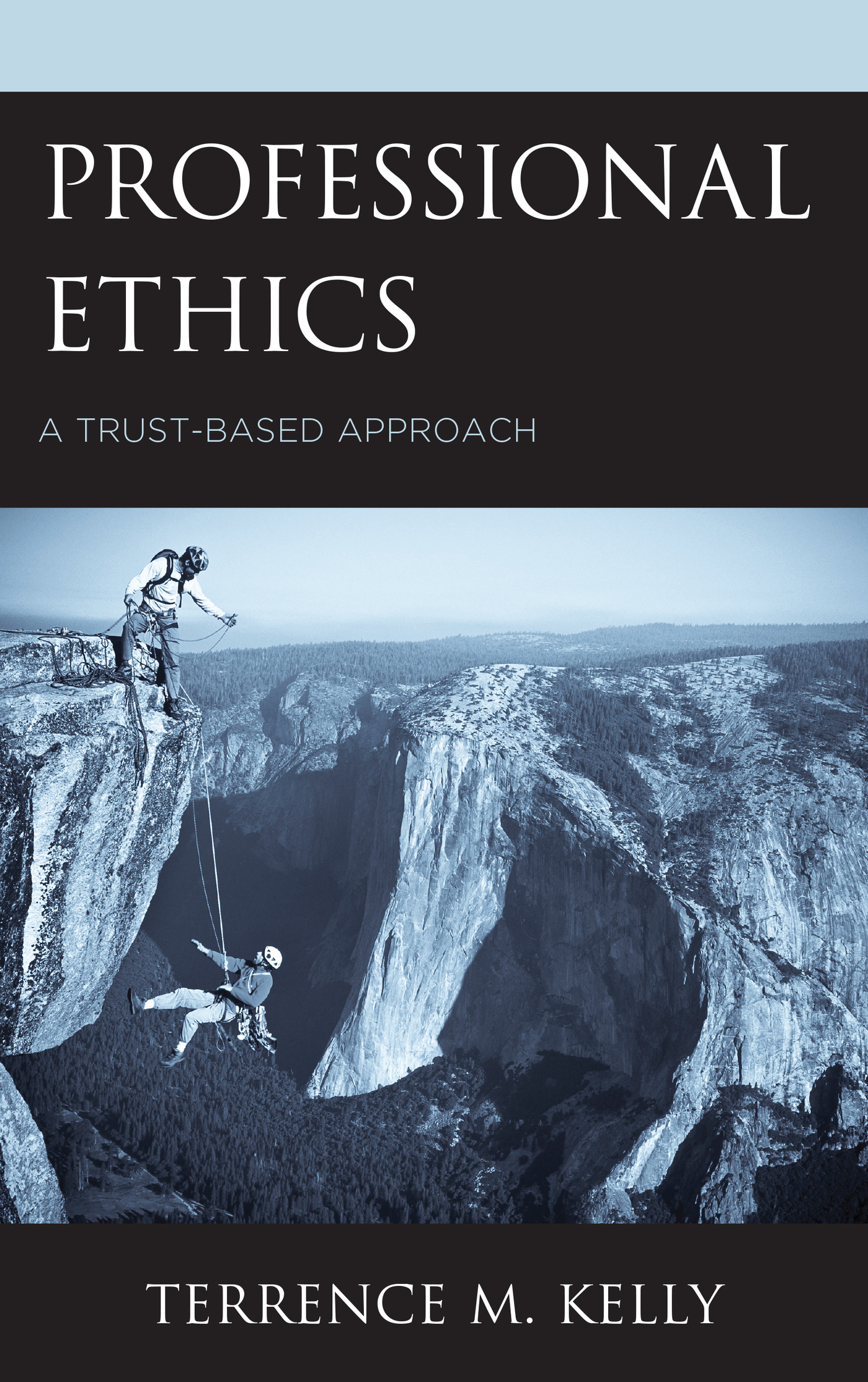Professional Ethics
Professional Ethics
A Trust-Based Approach
Terrence M. Kelly
LEXINGTON BOOKS
Lanham Boulder New York London
Published by The Rowman & Littlefield Publishing Group, Inc.
An imprint of The Rowman & Littlefield Publishing Group, Inc.
4501 Forbes Boulevard, Suite 200, Lanham, Maryland 20706
www.rowman.com
Unit A, Whitacre Mews, 26-34 Stannary Street, London SE11 4AB
Copyright 2018 by The Rowman & Littlefield Publishing Group, Inc.
All rights reserved. No part of this book may be reproduced in any form or by any electronic or mechanical means, including information storage and retrieval systems, without written permission from the publisher, except by a reviewer who may quote passages in a review.
British Library Cataloguing in Publication Information Available
Library of Congress Cataloging-in-Publication Data
Names: Kelly, Terrence M., author.
Title: Professional ethics : a trust-based approach / Terrence M. Kelly.
Description: Lanham : Lexington Books, 2018. | Includes bibliographical references and index.
LCCN 2017061423 (print) | LCCN 2017059287 (ebook) | ISBN 9781498513630 (Electronic) | ISBN 9781498513623 (cloth : alk. paper)
Subjects: LCSH: Professional ethics.
Classification: : LCC BJ1725 (print) | LCC BJ1725 .K45 2018 (ebook) | DDC 174--dc23
LC record available at https://lccn.loc.gov/2017061423
 TM The paper used in this publication meets the minimum requirements of American National Standard for Information Sciences Permanence of Paper for Printed Library Materials, ANSI/NISO Z39.48-1992.
TM The paper used in this publication meets the minimum requirements of American National Standard for Information Sciences Permanence of Paper for Printed Library Materials, ANSI/NISO Z39.48-1992.
Printed in the United States of America
For Elias and all other future trustworthy professionals.
May they make the world a better place.
Acknowledgments
Successful professional practice is made possible by the existence of supportive communities, and so it is with this book, which owes its existence to the contributions of many members of my professional and personal community.
First and foremost I would like to thank my two Cheryl Mandalas one my wife and the other Cheryl my mother-in-law. Cheryl-the-wife offered unstinting support, enlightening conversation, and editorial skill during the trials and travails of writing this book. Cheryl-the-elder served as my master editor and selflessly poured over the entire text, more than once and often on short notice, and offered endlessly valuable corrections, thoughts, and ideas. Without the two Cheryls, the book simply would not exist.
I would also like to thank Jana Hodges-Kluck at Lexington Books for her encouragement and support during the writing and production of the book.
The book benefited from audience feedback and conversations at meetings of the Association for Practical and Professional Ethics, the American Society for Bioethics and the Humanities, and the American Philosophical Association.
The book also benefited from comments by an anonymous reviewer for Lexington Books, and by anonymous reviewers of an earlier essay on conflict of interest for the Cambridge Quarterly for Healthcare Ethics. I would like to thank my professional ethics students at the University of Alaska Anchorage (UAA) who offered important and helpful feedback on earlier drafts of the book. My colleagues in the philosophy department and Alaska Ethics Center at UAA also provided important ideas and feedback for the book.
The book project was supported by travel grants and course releases from the College of Arts and Sciences at UAA, and I thank Dean John Stalvey for his support of the project.
Last but not least I want to thank James Lord, Alisa Carroll, Danielle Dittmer, and all the other professionals who have served as personal exemplars of the trustworthy professional, and who provided instrumental support during the writing of this book. Finally thanks to my mentor, James Bohman, who guided me into professional philosophy and continues to serve as an inspiration.
Elements of chapter 6 appeared in Conflicts About Conflict of Interest: A Comparison of Performance and Trustworthiness Models of COI in the Context of Industry Relations with Physicians, Cambridge Quarterly of Healthcare Ethics 25, no. 3 (2016): 526535. Reprinted with permission.
Introduction
The professions stand at an important crossroads. Beset by scandal, changing social expectations, and economic pressures, the credibility and legitimacy of the professions have been subject to unprecedented scrutiny. Some critics argue that the idea of a professionunderstood as a self-governing expert community committed to a service idealis a sham that simply promotes the economic interests of professionals. On this view, the professions are but cartels, aimed at monopolizing markets and promoting the bottom line of professional enterprises. Others argue that professionals are no longer worthy of the unique trust extended to them because professional misconduct is so ubiquitous that the idea of entrusting critical interests to professionals is no longer rational. Aside from misconduct, changing social expectations have made the idea of trusting professionals obsolete. In medicine, for instance, the paternalistic idea of doctor knows best has been subject to fatal moral and legal critique. Even virtuous doctors cannot help but introduce values into their medical decisionsvalues they have no right to impose on patients. Finally, even some professionals themselves suggest that professional practice would be more lucrative without the rigorous moral demands created by professionalization.
Is the idea of professionalism obsoletea dangerous dinosaur of the past that promotes inefficiency and exposes the public to the unscrupulous? The central thesis of this book is that the rumors of the death of professionalism have been greatly exaggerated. The idea that some occupational groups should be organized into relatively self-governing communities committed to strict ethical standards in the promotion of a service ideal is a necessary consequence of the fact that some occupations, by their very nature, offer their expert assistance to others in a way that requires reliance under conditions of knowledge and power asymmetry. When people rely on doctors, lawyers, bankers, engineers, accountants, therapists, and the like, they must entrust important interests to the discretionary care of the professional. This is a functional imperative of the professions. If clients, patients, students, and the public were not willing to extend their trust to professionals, many of those occupations would not exist, while others would be but empty shells of what they are currently.
This book explores the role of trust in understanding the logic of the professions, particularly the unique ethical demands placed on professionals and professional communities. Chapter 1 explores the apparent divergence between ordinary morality and professional ethics. Why should professionals be held to unusually strict standards of conduct? Some have argued it is because they have promised to do so. But this does not explain why they should promise to do so. Others point to the important role of professionals in satisfying social needs. However, these approaches do not explain why professionals have obligations to the specific clients, patients, and students they serve. A third way is offered by considering professional obligations in light of the trust that professionals must invite and develop given the defining goal, or
Next page
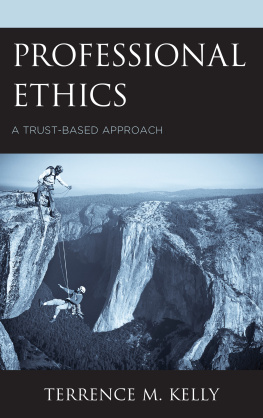
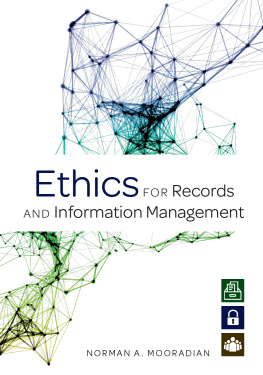

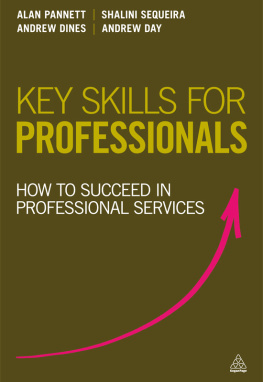

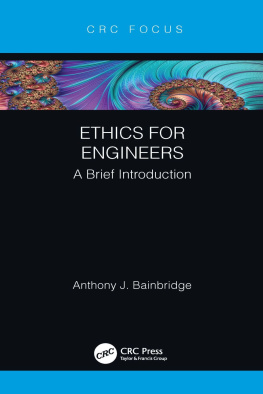
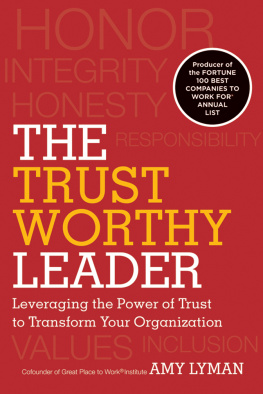
 TM The paper used in this publication meets the minimum requirements of American National Standard for Information Sciences Permanence of Paper for Printed Library Materials, ANSI/NISO Z39.48-1992.
TM The paper used in this publication meets the minimum requirements of American National Standard for Information Sciences Permanence of Paper for Printed Library Materials, ANSI/NISO Z39.48-1992.